- Home
- Ralph Peters
Cain at Gettysburg Page 2
Cain at Gettysburg Read online
Page 2
Left alone in Butterfield’s personal tent, he paused and held the pen suspended an inch above the paper. The army’s dispersion haunted him. The first order of business would be to concentrate his force so every corps could rush to support another. He was not going to let Lee eat him one bite at a time. The first of them to concentrate might well emerge the victor.
Nor did Meade intend to let his adversary surprise him. He remembered the follies of past commanders too well. If George Meade had any say in it, the next time Robert E. Lee fought the Army of the Potomac, he was going to have to fight all of it.
It was all a matter of time. And how could there be enough time now? He began to write:
The order placing me in command of this army is received. As a soldier, I obey it, and to the utmost of my ability will execute it. Totally unexpected as it has been, and in ignorance of the exact condition of the troops and position of the enemy, I can only now say that it appears to me I must move toward the Susquehanna, keeping Washington and Baltimore well covered, and if the enemy is checked in his attempt to cross the Susquehanna, or if he turns toward Baltimore, to give him battle.
On the edge of his consciousness, horses galloped off. But there was more to write. He wished to complain, but did not. He remembered Hardie’s remarks about Hooker sounding too much like McClellan. Lincoln read the telegrams received by the War Department.
When he finished, he blotted the paper, wiped the ink from his fingers, and stepped out of the tent. The morning was bright, hot, fierce. Terrible marching weather. But the men would have to march, and more than one of the marches would be long. He handed the message to the waiting courier, who leapt to the saddle and spurred his mount toward Frederick. The man’s alacrity drew a faint smile from Meade, who saw that his reputation as “Old Snapping Turtle” was already having its effect on the headquarters.
Enjoying a new pulse of confidence, he returned to the tent where the staff awaited him. The canvas sides had been rolled up to let the air pass through.
Hooker wasn’t there. And several officers were missing. Meade turned a quizzical look on Butterfield, but the chief of staff remained mute.
Meade’s son, face pale, spoke up. “General Hooker’s gone, sir. He just rode off. Colonel Hardie left with him.”
Suppressing a burst of fury at the snub, Meade told himself that it was better so. Now he could get down to the business of organizing the army, without unnecessary niceties. If Hooker had funked it, good riddance.
He allowed himself a single sigh as he strode to the table that still bore the map of Maryland. “Butterfield? Have one of your officers fetch a map of Pennsylvania. There’s work to be done, man. We need to designate points of concentration for this army.”
Butterfield passed on the order to a major, who stood close enough to have heard each word the new commanding general had spoken.
Meade glanced around the reduced group of officers. “Would you gentlemen excuse us? General Butterfield and I have a few affairs to discuss.”
Obedience wasn’t a problem. The big tent emptied rapidly.
Meade stepped closer to the man on whom he would have to rely. The chief of staff smelled of cologne water. “Well, Dan, we’ll have to make the best of things, you and I.”
Butterfield’s face was a mask without emotion.
“I know I haven’t been in the good graces of this headquarters of late,” Meade went on.
“Nor I in yours, General Meade.”
“But I think we shall manage. We must.”
Butterfield remained impassive. It exasperated Meade, who had reached the limit of his affability. He didn’t like Butterfield, never had. He only hoped he could trust him to do the right thing for the army, if not for its new commander.
The major sent for the Pennsylvania map returned, hesitating at the entrance to the tent. Meade beckoned him inside.
“Spread it on top of the Maryland map,” Meade told him. “General Butterfield and I will need them both. Then tell the rest of the staff to come back in.”
The major did as ordered, then eased away. Meade stepped to the table.
“Major!” he called after the man. “Major!”
“What is it?” Butterfield asked calmly.
Meade turned on his chief of staff. “Damn me to bloody blue blazes, I asked for a map of southern Pennsylvania.”
Butterfield considered the map. “That’s southern Pennsylvania,” he told Meade.
“I need a topographical map, man. This is nothing but a sketch of towns and roads. I need to see the terrain, the relief, the watercourses. That major should know as much.”
“That’s the only Pennsylvania map we have,” Butterfield said.
Meade looked at the man in astonishment.
The chief of staff shrugged. “We never expected to give battle in Pennsylvania, there seemed no need. Proper maps have been ordered, of course. They just haven’t arrived.”
Once again, Meade managed to rein in his temper. “All right, Butterfield. I’ll speak to Warren, he’ll see to the business. Just start at the beginning and explain General Hooker’s plan of campaign to me. I need every detail, no matter how small.”
“I can’t do that,” Butterfield said.
“What do you mean, you can’t?”
The staff officers had gathered outside of the tent, but waited to be bidden to come back in.
“He kept it all in his head,” Butterfield told him.
* * *
“You seen it, too. Ain’t I right?” Cobb asked. “All through the preaching, Colonel Burgwyn had the look of death on him. He’s a marked man, Quaker. I know you seen it. I seen you looking. Things don’t get past you.” Cobb widened his grotesque smile.
Sergeant Blake buttoned up his trousers and kept his breathing shallow. After one night, the green glade close to the regiment’s camp smelled foul. Cobb reeked, too, but that was his normal condition. This grove, where the morning coolness had drawn up its weakened lines for one last stand, deserved better.
“Shut your mouth,” Blake said. “You’re talking craziness.”
“Hell I am,” Cobb said, still spraying the ferns. “Hell, if you don’t know it, either. I seen you looking right at him. Plain as day, Quaker, that man ain’t long for this world.” He shook his head in mock sorrow. “Pretty fellow, too. And so young. Going to be a shame to see him go, a crying shame.”
In the distance, the regimental band started up, instantly recognizable by the music’s precision. Moravians from Salem, the musicians were the pride not only of the 26th North Carolina, but of the entire brigade. General Pettigrew was fond of calling them up to the head of the column whenever his men were about to march through a town. Even Yankees came out to listen, some of them.
“Guess the praying’s over,” Cobb said as the band leapt through a polka. “They’re meaning to cheer us up, I expect. But you and me … we know better. Don’t we now? You and me, Quaker, we know what’s coming. Old Marse Robert didn’t march us all the way up just to let us live off the fat of the land and scare Dutch girls. No, sir, he didn’t. They just give us these pretty new uniforms to be buried in.”
Blake looked at the little man. At God’s hideous excuse for a man. A nose eaten by sores topped a mouth whose last teeth ran black. Cobb’s new gray tunic was already stained by tobacco juice or worse. A leathery creature of unknown age, his only pleasing feature was thick black hair, but that crawled with lice. Now and then, the men tossed him into a creek, which Cobb accepted as part of his fate on earth. He was the only man in the company with whom no other soldier would share a blanket.
“I didn’t know you had gypsy blood, Cobb,” Blake remarked.
Finishing up his business, Cobb smiled again. “My ma was a McCaslin, she had the sight. Guess it passed on down to me, after all.” His smile widened, revealing a grim chasm. “Though it don’t take no second sight to see as how the colonel’s marked for death.” He laughed, a mean sound. “Anyhow, you know the McCaslins and what�
�s said about them. From your shopkeeping days.”
Yes, he knew of the McCaslins. They were the only clan in the hills to whom no one would give credit, not even when they sent the children to town to beg. Other, worse things were said about them, too. But even the bony, sliver-faced McCaslins compared favorably with little Cobb.
“I should charge you for a court-martial. For talking about Colonel Burgwyn that way.”
Cobb cackled in delight. “You won’t, though, Quaker. No, sir, you won’t. ’Cause we understand each other, you and me, and you know that’s right. Goes all the way back to New Bern, when you and me were the only ones didn’t turn tail. You know you’ll need old Billy Cobb, sooner or later, when things get doing proper.” He laughed yet again. “Always wondered why you didn’t run off with the rest yourself. I mean, we all know why you joined up, Quaker. But I never could figure why you stood and fought like a man, when you didn’t need to. Now I know, though. Figured that out back at Culpeper Court House. And I expect I’m not the only one.”
Blake didn’t want to hear any more. He marched from the glade, toward the busy encampment, passing a boy squatting at the edge of the bushes. The soldier looked up, embarrassed and quivering.
“For pity’s sake,” Blake told him, “go farther into the trees.”
“I meant to, Sergeant,” the boy said in a pleading voice. He didn’t rise from his squat. Shivering all the while like a sick man. Although he had probably just eaten too many green plums.
“Better hide that pretty white bottom you got there,” Cobb told the lad. “Might some of the boys take a fancy to it.”
Cobb was the most repellent man Blake had ever met.
The morning sun had already turned mean. It looked to be another day of baking heat interrupted by sudden downpours. Blake was glad they weren’t marching, that this Sunday, at least, would be a day of rest. The men needed it. As he did himself. They had never marched longer and harder in his recollection. He needed to see about the hole in his right shoe, too. How thoughtlessly he once had arranged good, strong shoes on the bottom shelves of the store. Blake curled a rueful smile. Holes notwithstanding, at least he had shoes. Cobb and plenty of other soldiers didn’t. The 26th had the fine new uniforms the governor had sent as a gift to his former regiment, and the outfits made them the best-turned-out regiment in the Army of Northern Virginia. Until you looked down at their feet and saw that they were no better off than the rest.
If only Governor Vance had sent them shoes, Blake thought for the hundredth time. The winter-weight uniforms were only a torment in the summer heat. Even with their tunics rolled up and carried, men collapsed by the roadside on each day’s march.
Striding past the cook-fires of a sister company, Blake believed he had rid himself of Cobb, who was careful to be insubordinate only when there were no witnesses about. But Cobb was more agitated than usual and had stayed on his heels like a hound.
They passed two bearded men slaughtering a steer amid happy laughter. In the background, the Moravians played “Bonnie Blue Flag.”
“I know, don’t I, Quaker? Why you didn’t run off? Back then, when you and me kept the Yankees off, and they made you a sergeant and left me sucking a straw?” Eager and bright as a child he was, with his sordid nose and filth. “I’ve known why ever since that evening at Culpeper Court House.”
Blake stopped. “I should knock you down.”
The words only intensified Cobb’s glee. “But you won’t. You and me, we both know that. ’Cause you want them to take you for a gentleman, ain’t that right? Still hoping to be made up a lieutenant, a fine, high officer. But you won’t be. Not after Culpeper Court House. Everybody knows what you’re all about now, Quaker. And it ain’t just ‘Lost Lenore.’ They know. They just don’t say. Out of politeness.”
Blake turned. Fists balled.
Cobb cackled again and danced off. He always knew how far he could go, and that was how far he went.
Blake watched the narrow shoulders recede, the soiled black hair clotted below the brim of a worn straw hat. Most of the men already claimed to have lost the governor’s new kepis, favoring their worn slouch hats or straw that shielded them from the sun.
Disdainful of the Sabbath, a nearby game of cards spurred cries of victory and disgust. The band struck up “Wait for the Wagon.”
“I’m not a Quaker anymore,” Blake said.
His words were a breath, and only God could hear them.
* * *
Blake sat apart with a tin cup of coffee, concealed by a shade tree and trying to let things be. Cobb had unsettled him.
The coffee was fine, though, and that was something. The drink was the last of a “gift” pressed from a Dutch family in Fayetteville. The local men were timid, when they were in evidence at all, but the big Dutch housewives were bold and forthright. The man of the house, with a beard like a bib, had produced the measure of coffee only after his wife turned them down with an earful.
Blake admired the Pennsylvania countryside. All the men did. The great barns and the houses of stone or brick, as strong as fortresses, and the gardens dense with vegetables, the abundant fields of corn, astonished the men with whom he served, who knew only sag-walled cabins and rock-toothed fields that broke the men who chewed them with a plow. As terrible as war might be, for many a man from the hills it was a lark that spared his back, if not his feet. For a time, at least, the Bunyan twins and Hugh Gordon, Pike Gray and Tam McMinn, had entered a world in which they no longer needed to worry about feeding a pack of children or replacing an old mule that had died in harness. The Cause absolved them of all other obligations. All a man needed to do was to stand up and kill or be killed when the time came.
Pennsylvania was a foreign country to those men, so exotic it was unthinkable that it ever could have been governed by the same hand that ruled their knobs, narrow fields, and hollows. But it was not a strange land to Blake. He had not come to their mountain world until his fourteenth year. Before that, he had been housed by his mother’s family in Waterford, Virginia, where Quakers and other industrious sorts had drawn their own wealth from hard work and better soil. For Blake, the orderly towns of Pennsylvania, with their redbrick fronts and scrubbed stoops, brought a sense of homecoming he would have preferred to avoid.
The last of the coffee went cold. Blake drank the dregs. Although there were orders to give, Sabbath or not, he was not yet ready to move. He sat on in the shade a while longer.
The damnable thing was that Cobb was mostly right. It was uncanny. Blake, too, had noticed a queerness in Colonel Burgwyn, who had looked almost feverish during the psalms and sermon. Blake would not have put his impression into the words Cobb had spit out, but it chilled him to feel their rightness.
Yes, there would be a fight. Only God knew where. Probably beyond the high ridges to the east. As always, rumors thrived and grew extravagant. They were marching to Harrisburg. No, to Philadelphia. Or all the way to New York City. They would circle back to Baltimore, or descend upon Washington from the north and hang Lincoln from a sour apple tree.
No one knew what General Lee had in mind.
But there was this quiet day for which to be grateful. Blake wished he could find comfort in its Sunday-ness, but he could not. His upbringing had been left too far behind him, to the sorrow of so many. He had still read the Bible for a time after leaving his mother’s faith, but that came largely from habit, partly from guilt. Then the Good Book had drowned in the blood of Malvern Hill.
The regiment had gone in late and done little. But the carnage had stunned Blake. The regiment’s skirmishes in North Carolina had not amounted to war. Malvern Hill was war. What killed the last prayers left in him wasn’t a sense of revulsion at the suffering and death, but how much he loved it.
* * *
“Old George, ever cheerful…,” Reynolds kidded. “You sound as if you’ve been sentenced to hang at daybreak.”
“Haven’t I been?” Meade asked. They walked along a farm road beyond
the headquarters picket line. A cavalry unit had followed the track some hours before, leaving its visiting cards. The two generals stepped carefully.
“I suppose you’ll have the Sixth Pennsylvania for your headquarters guard now?” Reynolds said. His grin was friendly, but devilish.
Embarrassed to be caught out so readily, Meade tried to smile.
“Oh, come on, George,” Reynolds told him. “It wasn’t a brilliant deduction. Philadelphia society would never forgive you, if you didn’t. And Margaret would pin back your ears. Social standing has its obligations.” He chuckled. “At least your Rittenhouse bucks got rid of those sticks of theirs. ‘Rush’s Lancers’ indeed. They read too much Walter Scott in Philadelphia.”
“They took young George in,” Meade said, defending himself. “When he left West Point.”
“And they would’ve been damned fools, if they didn’t. He’s a fine young man. Just a bit too energetic for the old jail on the Hudson, I suspect. Come on, cheer up.”
Meade stopped to stare out across a field of wheat. Staring at nothing. The world smelled burnt.
“I’ll need your help, John,” he said. Unable to look the man who was now his subordinate in the face.
“Don’t underestimate yourself.”
The heat pressed down. Sweat bloomed. “I don’t. I never have. I’m a proud man, John. You know it. That’s part of my dilemma, I suppose. I don’t want to fail. The shame of it.”
“Then don’t fail.”
Meade turned to his friend. Reynolds was the shorter man, but more pleasing to the eye. The white hairs threaded into his beard graced him, while graying whiskers just made Meade look older.
“You should have had the command, John.”
Reynolds shrugged, smiled. “Well, I don’t. Now what the devil was so important that I had to ride over immediately?” He wasn’t bothered, though. His good smile held.

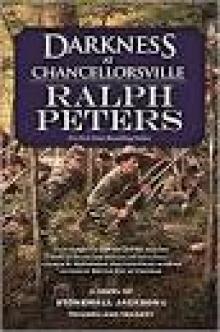 Darkness at Chancellorsville
Darkness at Chancellorsville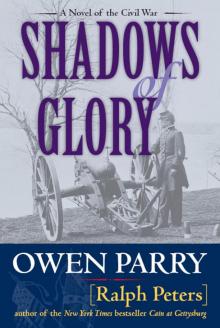 Shadows of Glory
Shadows of Glory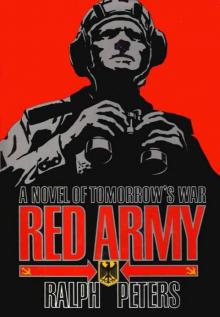 Red Army
Red Army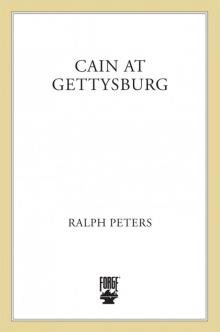 Cain at Gettysburg
Cain at Gettysburg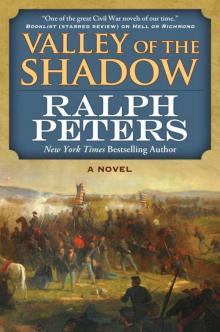 Valley of the Shadow: A Novel
Valley of the Shadow: A Novel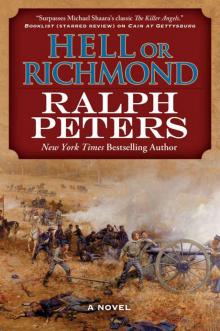 Hell or Richmond
Hell or Richmond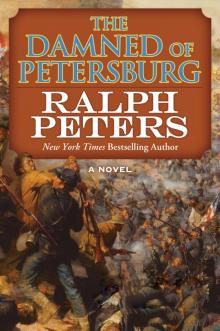 The Damned of Petersburg
The Damned of Petersburg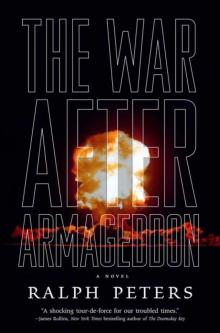 The War After Armageddon
The War After Armageddon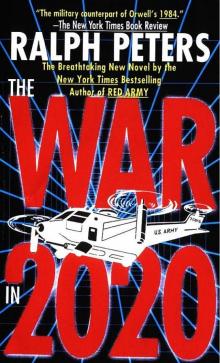 The War in 2020
The War in 2020